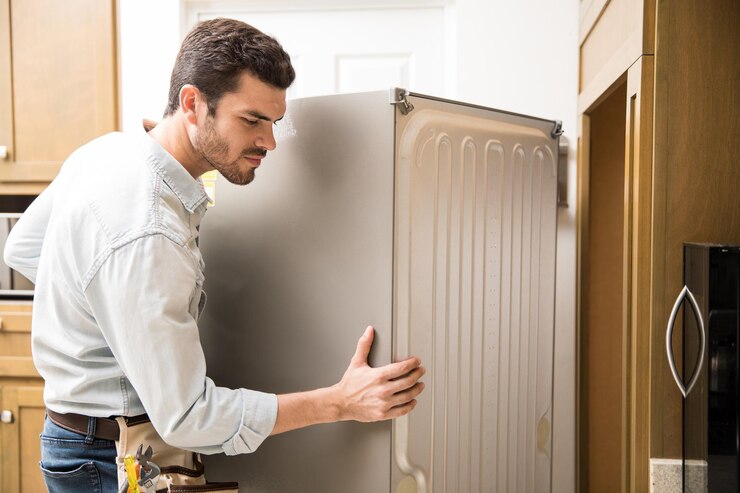Fixing Refrigerator Water leakage from a refrigerator can be frustrating and damaging. It is essential to identify the cause and take appropriate action to prevent further issues. This guide will help you troubleshoot common causes of water leakage and provide solutions to fix them.
Identify the Source of the Leak
Before you start fixing the problem Fixing Refrigerator Water Leakage, it’s crucial to pinpoint where the water is coming from. Familiar sources of water leakage in refrigerators include:
- Defrost Drain Blockage: Water pooling inside the fridge could be due to a blocked defrost drain.
- Water Filter Issues: A malfunctioning or improperly installed water filter can cause leaks.
- Door Seal Problems: If the door seal is damaged or dirty, it can lead to condensation and leakage.
- Ice Maker Malfunctions: Leaks near the ice maker can indicate a problem with the water supply line or the ice maker itself.
- Water Supply Line Leaks: A leak in the water supply line can cause water to pool at the base of the Refrigerator.
Fixing Refrigerator Water Leak Drain Blockage
Problem: Fixing Refrigerator Water Leakage The defrost drain is designed to channel excess water from melting ice and condensation away from the Refrigerator. If it becomes blocked, water can pool inside the fridge or freezer.
Solution:
- Locate the Drain: The defrost drain is typically found at the bottom of the refrigerator compartment or inside the freezer.
- Clear the Blockage: Use a thin, flexible tool like a pipe cleaner or a turkey baster filled with hot water to clear the drain. You can also use a mixture of baking soda and hot water to help dissolve any obstructions.
- Check for Ice Blockages: If ice is blocking the drain, you may need to use a hairdryer on a low setting to melt the ice gently. Be careful not to overheat the area.
Problem: A leaking water filter can cause water to pool at the bottom of your Refrigerator.
Solution:
- Check the Filter: Ensure the water filter is installed correctly and not damaged. Most refrigerators have a specific filter installation method, so refer to your user manual.
- Replace the Filter: If the filter is old or damaged, replace it with a new one. Make sure the replacement filter is compatible with your refrigerator model.
- Inspect Connections: Check the connections where the filter meets the Refrigerator. If there are any cracks or loose fittings, this could be the source of the leak.
Door Seal Problems
Problem: A faulty or dirty door seal can prevent the door from closing correctly, leading to condensation and water leakage.
Solution:
- Inspect the Seal: Check the door seal for cracks, tears, or debris. Clean the seal with warm, soapy water to remove dirt or grime.
- Test the Seal: Close the refrigerator door on a piece of paper or a dollar bill. The seal might only function properly if you can easily pull it out with resistance.
- Replace the Seal: If the seal is damaged or worn out, you must replace it. You can purchase a new seal from an appliance store or online. Follow the manufacturer’s instructions for installation.
Ice Maker Malfunctions
Problem: Leaks around the ice maker can be caused by a faulty water supply line or issues with the ice maker itself.
Solution:
- Inspect the Water Supply Line: Check the water supply line for any kinks or leaks. Ensure the line is connected correctly and not damaged.
- Check the Ice Maker: Look for any signs of leakage around the ice maker. If it is not working properly, it might need adjustment or repair.
- Consult the Manual: Refer to your Refrigerator’s manual for troubleshooting tips for your ice maker model.
Water Supply Line Leaks
Problem: Leaks in the water supply line can cause water to accumulate around the Refrigerator base.
Solution:
- Inspect the Line: Look for any visible signs of leakage in the water supply line. Ensure the line is connected correctly and not cracked or damaged.
- Tighten Connections: If you find loose connections, tighten them to stop the leak. Be careful not to overtighten, as this can damage the fittings.
- Replace the Line: If the water supply line is damaged, you must replace it. Purchase a new line from an appliance store or online, and follow the installation instructions provided.
Regular Maintenance Tips
To prevent future water leakage issues, follow these maintenance tips:
- Clean the Refrigerator Regularly: Regular cleaning helps prevent blockages and ensures proper drainage.
- Check Seals and Filters: Periodically inspect and clean the door seals and replace water filters as needed.
- Monitor Ice Maker and Water Lines: Monitor the ice maker and water lines for any signs of wear or damage.
When to Call a Professional
If you’ve tried these solutions and the problem persists, it may be time to call a professional. Issues with the Refrigerator’s internal components or complex problems with the water supply system might require expert repair.
Professional Help: A qualified technician can diagnose and fix more complicated problems that may not be easily identifiable. Getting a professional involved is often best to avoid further damage to your Refrigerator.
By following these steps, you can effectively address common causes of water leakage in your Refrigerator and keep it functioning smoothly. Regular maintenance and prompt attention to issues can help you avoid more severe problems and extend the life of your appliance.
